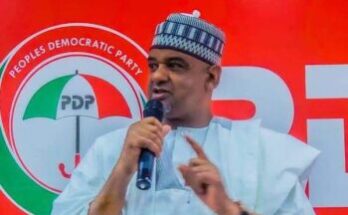The Peoples Democratic Party (PDP) has berated the All Progressive Congress (APC) for the recent National Bureau of Statistics (NBS) poverty report, adding that President Muhammadu Buhari’s administration can not give what it doesn’t have.
NBS in its report Thursday said the number of Nigerians living in poverty stands at over 133 million.
It said the figure represents 63 per cent of the nation’s population.
In his reaction, the Director of Strategic Communication of the PDP Presidential Candidate and former Vice President, Atiku Abubakar, Dele Momodu while addressing Journalists, Thursday, in Abuja said poverty is APC’s legacy.
Momodu who said only Atiku can take Nigerians out of the current trouble said, “the specific role given to our Atiku as Vice President was in the area of the economy, which we had the best under that government.
“That is why he said he will continue from where he stopped and that is why we are using recover Nigeria.”
On the NBS report, he said, “you can’t give what you don’t have and that is why Atiku Abubakar is the best choice, what he has been able to do in public life, what he has been able to do in his private life when you look at them you will know that he is the most experienced and prepared candidate in the race”.
On his part, Atiku Special Assistant on Public Communication, Phrank Shuaibu, lamented that the number of Nigerians living in poverty under the APC-led administration is alarmingly high.
Shuaibu who said the latest report calls for concern added that “included in this troubling reality is that over 23 million youths, mostly educated and potentially productive, are unemployed.”
He stated “this development portends only one thing, a threat to the security and stability of the Nigerian nation.
“From the monetary perspective, the Central Bank of Nigeria, whose job it is to check inflation claims that it is doing its best to ensure that the overall prices for goods and services remain low, stable, and predictable even as records on the ground point to the contrary.
“Although the Buhari administration claims to be empowering potential investors; big and small to improve people’s lives, records show that 54.7 percent of Nigerians are financially excluded due to low-level bank penetration in the country and that besides the 916 Microfinance Banks, the 24 ‘big banks’ have only a little over 6000 branches, mostly concentrated in a few urban centers.
“To worsen matters, the social safety net scheme introduced by the federal government in 2016, to tackle poverty and hunger has not made any significant impact owing to poor implementation, corruption allegations and politicisation.
“Only a sensible government will reckon that by redirecting public expenditure away from recurrent expenses and unnecessary consumption back to capital projects, the government can have a positive impact on incomes and employment.
“Such newly-employed individuals can in turn pay their bills, rent and essentials, thus providing income to the farmers, herdsmen, landlords and the like.
“Industrial policy, the kind that is encapsulated in Alhaji Atiku Abubakar’s blueprint, is another area to concentrate on. A nation of 200 million people cannot abandon its manufacturing sector in favor of importation. We must ensure that most of what we eat, drink, wear or otherwise use on daily basis is locally produced, thereby creating local employment and saving foreign exchange.
“The current policy thrust may give government additional revenue but it is wasting scarce resources and generating more jobs and incomes for foreign countries.
“One thing is clear from what the Wazirin Adamawa brings to the table: that agriculture remains the most viable sector if unemployment and low income are to be properly tackled. This is understandable since agriculture still provides most of our people with their only employment and source of income, and contributes more to GDP than the petroleum sector.
“All said, Nigerians need to concentrate on employing more people in that sector, boosting their production and productivity. Critical to this is the creation of linkages between agriculture and industry, modernizing farming and animal husbandry, providing inputs and improved varieties as well as developing and providing cheap implements, as part of the overall strategy to reverse Buhari’s legacy of poverty.”




